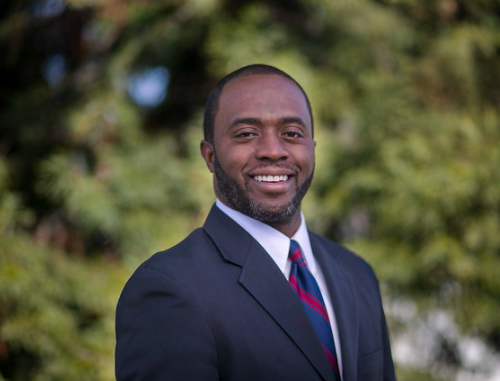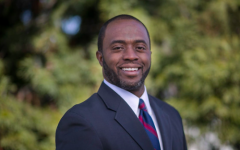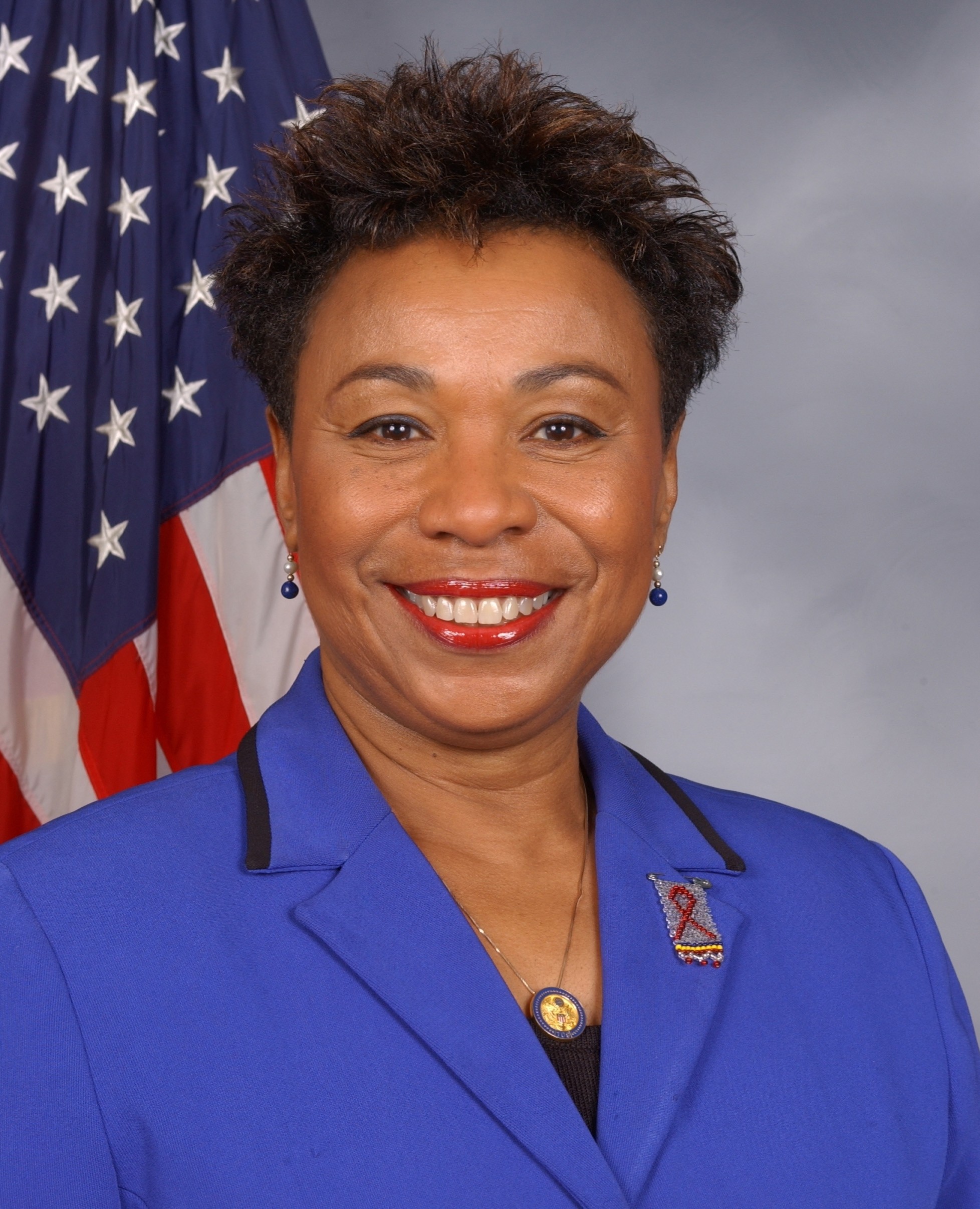
Tony Thurmond. (Photo: cde.ca.gov)
The Curious Case of CA Schools Superintendent Tony Thurmond and Daniel Lee
Superintendent Thurmond defended the CDEF and said it is able to ‘leverage funds’ and perform other tasks the state cannot
By Thomas Buckley, May 23, 2023 3:59 pm
In 2021 (or thereabouts), California State Superintendent of Public Instruction Tony Thurmond had an idea – let’s form an Office of Equity in the California Department of Education, or CDE.
Thurmond also knew the perfect person to run said office – longtime friend and education expert and psychologist Daniel Lee.
Even better, Lee – despite having spent his life back east – was already familiar with California as he was doing some work for the Californians Dedicated to Education Foundation, or CDEF, a non-profit foundation that supports the CDE and is so closely tied to the government agency that when they were established more than a decade ago they chose – almost certainly on purpose – similar initials.
The Office was created and Lee – who was close enough to Thurmond that he was in his wedding party – was hired.
At around the same time, Pam Kadakia – a Texas-based instructional specialist with a diversity emphasis – also joined the CDE to work with Lee. She had also been working at the CDEF.
Lee joined the CDE in the summer, Kadakia in the fall of 2021. By December, they were gone after having “got resigned” when it was finally noticed, despite the personal relationships and months long hiring processes, that they didn’t actually live in California, a legal requirement for both positions.
The Globe covered the incidents, which also garnered national coverage due to the rather obviously icky nature of how they got hired in the first place – an ickiness that involves both the CDE and CDEF.
In brief, the CDE is the state office that oversees K-12 education – funding, programs, etc. CDE staff tend to downplay their direct role in the classroom, saying each individual local school district really sets the exact classroom policies. The CDE also funnels state money to schools (more than local property tax revenues generate,) offers training programs, and creates model curricula.
The CDEF was started in 2011 to be a “trusted partner” with the CDE – it even calls itself the agency’s “fiscal manager” (exactly what that means is unclear as the CDEF did not respond to numerous requests for information and/or comments; as per Globe typical practice, those questions are listed below.)
The CDEF has donors across the spectrum of the state’s “blobosphere” of soft-power foundations from Bechtel to Chan Zuckerberg. It also gets money from the teacher’s union and various other school employee associations.
“There is no need to have an outside foundation whatsoever,” said Lance Christensen, a vice president with the California Policy Center and former candidate for Thurmond’s job (superintendent is an elected position and that operates the department while the state Board of Education is involved in policy matters and is made up of gubernatorial appointments.)
Christensen compared the relationship between the CDE and CDEF to the notorious “behested donations” that plague state politics, a loophole that allows electeds to have donors give to pet causes, therefore allowing said donors significant access to favors without technically breaking California law.
While it is not clear which donor – or if any – specific donor paid for Lee’s time at the CDEF, it is stated by Thurmond that his new job at the CDE was to be paid for via a “two-year Hewlett Foundation grant.” That foundation appears to also be a CDEF donor.
In Kadakia’s case, an email states her $124,800 per year job at CDEF was funded by a grant from the massive international infrastructure firm Bechtel.
State Superintendent Tony Thurmond defended the CDEF and said it is able to “leverage funds” and perform other tasks the state cannot, but stressed “no one at the CDE has any influence on the board or staff of the CDEF.”
That statement seems rather at odds with the reports of his involvement in Lee’s hiring at the CDEF and hundreds of internal documents – mostly emails – the Globe has obtained.
(PROCESS NOTE – a southern California resident submitted a public records request and was sent the documents. The person was in contact with this reporter on another matter when she referred to the issue and the Globe asked if she could provide copies of the emails. Unless specifically noted, all of the quoted information below comes from those documents.)
Going back to the beginning, Lee was hired – with Thurmond’s influence – by the CDEF in 2020. By the summer of 2021, the CDE asked the CDEF to “move him off the CDEF payroll” and into a newly created deputy superintendent position in charge of a newly created Office of Equity.
Between mid-June and the end of August, emails between flew between staffers, trying to figure out how best to achieve that goal. The appointment had to be approved by the Governor’s Office as it was an “exempt” position (that means something different than in the private sector and does not involve overtime pay and such). Lee’s hiring package and oath of office had to be prepared, and his end date with the CDEF had to be made to align with his start date at the CDE.
Eventually the process was completed but it seems that at no time was it noticed or mentioned or red flagged by either the CDE or the Governor’s Office – which presumably reviewed the 18-page resume he provided, that clearly states he “resides in Philadelphia, that he lived out of state and was ineligible for the position. Whether or not it was simply ignored is unknown.
A similarly chaotic process occurred with Kadakia’s move from the CDEF, which involved her end and start dates being adjusted, or “back dated,” to make sure she was not technically working for both organizations (to her credit, Kadakia noted she didn’t want to get in trouble due to such an issue.)
Lee’s hiring also involved a bit of confusion, if you will, over start and end dates.
Mary Nicely of the Superintendent’s Office said there was “nothing special about the process” when asked if the numerous internal back and forths and date changes and such were typical of CDE hiring practices.
Thurmond said the pandemic and its remote work environment issues played a role in the snafu.
How does that matter? Because both Lee and Kadakia were – while employed by CDEF – were already working directly with the CDE on an apparently remote basis.
In fact, Kadakia’s position at the CDEF was “embedded at the CDE, guided by CDE leadership, while the CDEF remains the employer of record.”
In other words, Kadakia was already an employee in all but name of the CDE when the decision was made to shift her from the CDEF in September(ish), 2021. That shift eventually occurred in November, as noted by CDEF CEO Jessica Howard who emailed Nicely “Congrats on bringing her on board in-house at CDE.”
Thurmond was taken aback by the word “embedded” and when asked said “at this time there are no embedded CDEF employees” at the CDE.
Finally, in the resume Kadakia submitted to the CDE as part of getting hired by the CDE she listed the CDE as her current employer – just a reminder, it was actually the CDEF.
It also appears Lee was similarly close to the CDE while with the CDEF.
To say the lines are blurred between the “private” CDEF and the CDE would be an understatement.
Then there is the question of “Why?” Why did the CDE bother to hire two people who were already essentially doing the job but being paid by someone else? While it is true that working directly for a state agency is a nice notch to have on a resume and the benefits may have been better and enrollment in the state’s pension system is a plus, the pay was to be about the same for both Lee and Kadakia – in Kadakia’s case it was exactly the same. So, besides saving the CDEF money and giving Lee and Kadakia prestige points, it does not appear that from a work product standpoint it mattered, leaving one to wonder what was the actual objective.
Despite his categorical declaration of CDEF’s independence, Thurmond did say the CDEF allows his office to “grow our capacity” and acknowledged that both Lee and Kadakia were “hired through” the CDEF.
As to Lee, in a June email, a staffer states “I’ll be submitting Dr. Lee’s package for HRLRB (personnel) on Wednesday after I complete the justification. I had some questions about the justification, as Dr. Lee currently does this job paid through CDEF. Should I mention that in the justification or should I write it entirely as a new position?”
An exact answer to that question does not readily appear, though it did precede discussions about modified “org charts” and titles and such.
It should be noted that staffers do reference on occasion the “out-of-state” status of at least Kadakia – in Kadakia’s case one email notes she wants to discuss hiring issues while she happens to be in California. Again, Thurmond said it was a “misunderstanding” and that no one “flagged” the issue and that (while they were doing the same job for CDEF) they had already been working remotely, causing the residency issue to be overlooked.
After all of that rigamarole, both Lee and Kadakia were forced to resign just a few weeks after they started with the CDE due to the residency issue brought up in the Dec. 11 Politico story.
On Dec. 13, 2021, then Assemblyman, now Congressman, Kevin Kiley notified the governor’s office of the matter. That same morning, Jay Jefferson of the Governor’s Appointments Office sent an email to a CDE staffer as a “follow up” to an earlier call pointing out the governing language and that “Given the circumstances, it would be best if there could an arrangement for a letter of resignation.”
Lee was gone from his $165,000-ish job the next day and when Kadakia’s similar situation came to light she too left.
With all of that, the question of what both Lee and Kadakia were supposed to actually do remains.
Lee was to become chief of a purposefully-created Office of Equity where he would “bring cohesion in all of our equity work.” Kadakia – who is trained in “anti-bias/anti-racism (ABAR)” was to work for Lee in the new office.
California Legislative Analyst’s Office deputy analyst for K-12 education Edgar Cabral said Thurmond legally does have wiggle room to create new offices without direct legislative action.
“The legislature did not provide specific funding, but within the department he has some flexibility to support a priority,” Cabral said.
Kadakia’s job at the office was described as helping to implement policies “using a lens of equity, collaboration, and inclusion to create responsive, timely, and outcome driven projects that are replicable (and) sustainable” and to be “an active thought partner in the development of strategies to integrate and sustain EDI frameworks and policies.”
(Note – your guess is as good as mine as to what any of that means.)
As the Superintendent has called equity helping all students to “close the achievement gap” and being able to access something akin to “my own experience” growing up and has set it as one of his office’s priorities, one would naturally wonder who has filled Lee’s and Kadakia’s positions.
That answer is no one.
With Lee and Kadakia gone, the Office of Equity no longer exists, though Thurmond said the work continues through the two CDE staffers who co-chair an “equity committee.”
The fact that the Office was seemingly created for Lee and Kadakia and went away once their jobs were red-flagged and that they both came directly from the CDEF would seem to raise certain ethical questions. Thurmond had high praise for Lee’s work (he started his social work career with Lee and “watched him work with low-income kids”) and said that if it weren’t for the residency issue office would still exist.
“They have done things here and they would still be here” if there was no residency issue, Thurmond said. “We weren’t told about any ineligibility.”
“It screams corruption,” said longtime teacher and now education watchdog Rebecca Friedrichs.
Friedrichs said of CDEF that “my first guess is that it is a slush fund” for the CDE. She is also deeply troubled that organizations like the teacher’s union and CASEL – one of the nation’s leaders in providing “social-emotional learning (SEL) – are CDE donors.
By the way, social-emotional learning – SEL – according to its proponents, is a holistic template that allows students to grow and share; opponents say it is a multi-million dollar rip off of taxpayer dollars and is used as a “Trojan Horse” to politically indoctrinate students. I’m thinking the latter, but you decide – pro and con.
Thurmond stressed repeatedly that the CDE does not set final policy at the district level, but clearly the department has vast amounts of sway through funding, targeted grants, creating statewide testing standards, and setting curricular frameworks. The CDE – and it seems it non-profit friend – unquestionably set overarching policy and discourage local districts from wandering too far afield from their “progressive” objectives.
“The CDE manipulates local school board members into thinking their hands are tied,” Friedrichs said. “They’re not. As with so much on so many things, the CDE is lying.”
As promised above, the questions the CDEF would not deign to answer:
· Prior to direct CDE employment, both Lee and Kadakia were employed in identical positions by the CDEF. What then was the point of moving them over to the CDE?
· Did the superintendent play a role in the hiring of Lee and Kadakia by the CDEF?
· Were the hirings of Lee and Kadakia by the CDEF viewed as “trial runs” for their eventual CDE employment?
· Were the positions held at the CDEF also created out of whole cloth for Lee and Kadakia?
· Why does the CDEF exist and what role does it play – as it itself states – in the “fiscal management” of the CDE?
· Could the CDEF be described as a side fund for the CDE as it may be able to engage in certain activities the CDE cannot by law?
· Do CDEF donors get special access to CDE personnel?
· Is it not a conflict of interest that CDEF donors have ties to the CDE
· As with Lee and Kadakia – whom it appears were paid by specific CDEF grants even while employed by the CDE – are there other “embedded” CDEF employees/contractors within the CDE performing CDE functions?
· With both Lee and Kadakia, CDE staff had significant difficulty lining up their hire/fire dates to make the move to the CDE. Why did this occur and did either Lee or Kadakia receive any additional CDE and/CDEF pay during the transition?
· Is backdating employment start and/or forward dating departures – as was done in the case of Lee and Kadakia – ever appropriate?
· The relationship between the CDE and CDEF could be described in a number of ways, such as symbiotic, parasitical, supportive, improper, convenient, discomforting and/or intricately interwoven. How would you describe the relationship?
- Where Does Gascon Go From Here? - April 25, 2024
- Anti-Semitism, Self-Immolation, Intersectionality, and DEI:What Do These Have in Common at UCLA Medical School? - April 25, 2024
- Los Angeles DA Gascon Ethics Chief Charged with 11 Felonies - April 24, 2024





Fascinating (albeit sickening) in-depth case study of state office and state officeholder corruption. Apparently for a very long time this kind of set-up has been more the rule than the exception in California. And the set-up even follows a sort of formula, one we run into again and again and again. Amazing how much feigning of ignorance and “no, nothing unusual here, everything’s fine, it’s just routine” stinks up the place when they know and so do we that what they are doing is clearly wrong. And even more amazing, Tony Thurmond is STILL the State Supt. of Public Instruction.
Raid the treasury and hire the relatives. Instant third world status.
Tracking three degrees of nepotism within our vast state employment roster could be chilling. Just among K-12 cafeteria workers, for a start.
Thank you for the article about Superintendent Tony Thurmond and Daniel Lee. It is unfortunate that Lee was forced out of the Superintendent of Public Instruction Office without understanding why and due to power struggles. It’s clear that something needs to be done about the lack of transparency in the office, which should ensure that decisions are just and free from outside influence. At the same time, it’s important to recognize all of the positive work Superintendent Thurmond has done in his tenure, especially for the students of California.